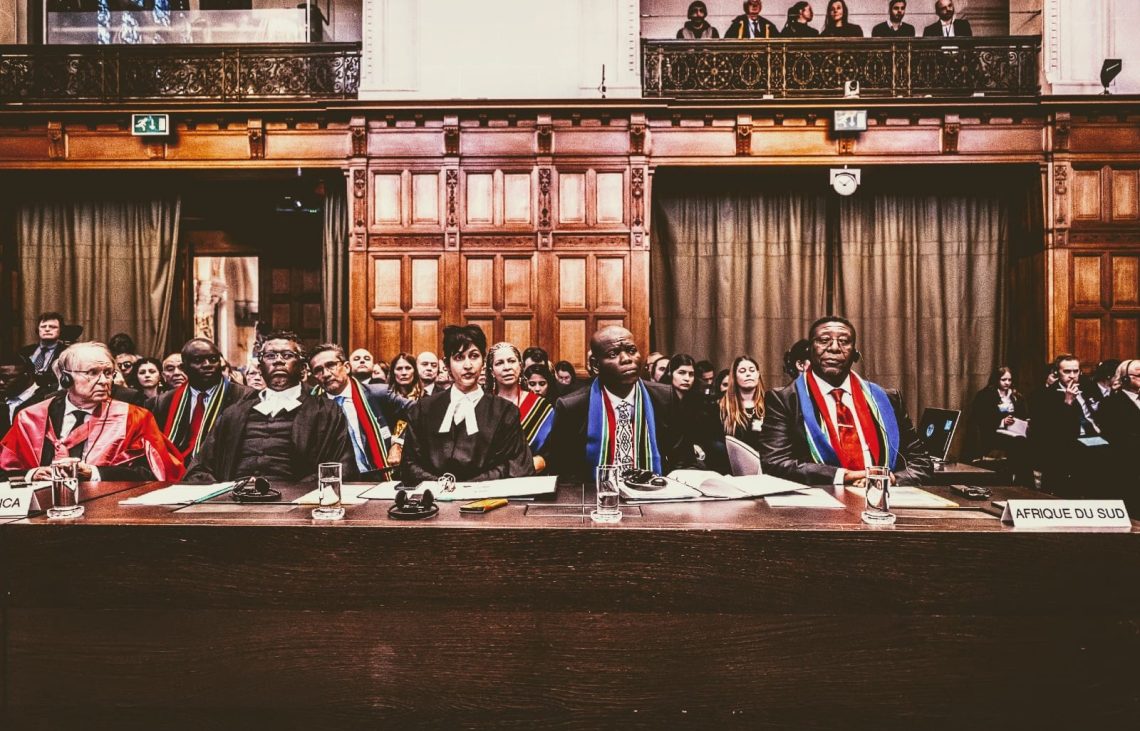On the 11th and 12th of January 2024, at The Hague, the International Court of Justice (ICJ) held public hearings on the request of South Africa, which accused Israel to commit genocide against the Palestinians in Gaza, and demanded urgent provisional measures to be adopted.
The ICJ is a UN organ, and the only international court to settle disputes between states in accordance with international law.
Like many other people, during the days of the hearings we couldn’t turn away from the screens while South Africa was presenting its case, and one day later, Israel was presenting its defense.
As probably many other readers, while perceiving the importance of these moments, we were also left with many questions.
We decided to ask some of these questions to Luigi Daniele, Senior Lecturer in International Humanitarian Law and International Criminal Law at Nottingham Law School.
1. How long do you think the verdict of the Court can take? And what could be the outcome?
Luigi Daniele: The court is now only deciding on the urgent provisional measures requested by South Africa. I expect this verdict to be near. In my estimation it could be a matter of days or maximum a couple weeks.
For these interim measures it is sufficient for the Court to be satisfied that it is “plausible” that the Genocide Convention has been and it is being breached, that there is a risk of irreparable harm for civilians in Gaza and that urgency exists.
South Africa in my opinion has presented a compelling case for these measures.
It is important to note that at this stage the Court is not deciding over the merits of the allegations of breaches of the 1948 Convention on the Prevention and Punishment of the Crime of Genocide. South Africa accuses Israel of acts threatened, adopted, condoned, taken and currently being taken by the Israeli government and military against the Palestinian people of Gaza, as a distinct national and ethnic group, in the wake of the attacks in Israel on 7 October 2023 (which South Africa also takes issue with, condemning in the first lines of its application all violations of international law by all parties).
In particular, the recurrent state accuses Israel of not having prevented and having committed three of the conducts prohibited under article II of the Convention, that is, respectively, (a) killing members of the group, (b) causing serious bodily or mental harm to members of the group, and (c) deliberately inflicting on the group conditions of life calculated to bring about its physical destruction in whole or in part, with the underlying intent to physically destroy a substantial part of the victim group. The intent can be found, according to South Africa, in the dozens of government officials and military personnel statements which are by now well known.
The merit judgment on these issues, however, could take several years.
2. What role do states play in the decisions of judges? Do the judges of the ICJ represent their countries?
LD: No. Judges are nominated by states but once elected they are not delegates of the government of their countries, nor of those of any other state. Members of the Court are independent judges with the task of applying international law without fear or favor. Before taking up their duties, they also make a solemn declaration in open court that they will exercise their powers impartially and conscientiously.
Of course they have their views, background and interpretations.
This is not to say that the ICJ works in a political vacuum, or that it operates in the empyrean of pure theory of law. Of course all courts and tribunals operate in a political reality but this time this means mainly that this is obviously more than just a case on provisional measures and plausibility of genocide allegations. It is a case against a major violator of international law that, unlike the Russian Federation, has enjoyed the unconditional support of Western powers and double standards of international legal policies by Western states.
Hard to imagine a clearer test bench for the Global South to measure whether international law is really what we affirm it to be, for all, or rather an extension of power relations to outcast strategic rivals.
3. What does the ICJ ruling mean in practice? Considering Israel has not complied with UN resolutions before, what could be different in this case?
LD: A Court order of provisional measures would be immediately binding. It is a normative intimation. It is law, so to say. Curiously, Netanyahu declared soon after his own legal team argued before the Court, “Nobody will stop us – not The Hague, not the axis of evil and not anybody else”. He has, in other words, promised to violate a legally binding order before it was even issued, in case it was issued. It seems to me this is further isolating the Israeli government. Even for allied governments it becomes much more difficult to continue their support in open rejection of the Court’s orders.
Should the Court order provisional measures and should the Israeli government effectively refuse to abide by them (as announced), the matter could be brought to the UN Security Council for enforcement. It is not to be taken for granted, in my opinion, that the US at that point would continue to abuse its veto power, since the Biden Administration has already lost millions of voters each time it has vetoed ceasefire resolutions. The political costs would be even more dramatic and unprecedented should the US veto the enforcement of provisional measures ordered by the world court.
4. What does a positive or negative ruling in this case mean to the international order?
LD: It means everything. International law as a whole is at a crucial turning point. The Global North nearly in its entirety has proven unable to take any step to restore international legality, aggravating its responsibilities accumulated during years of complicity with an illegal, unsustainable status quo that has only cyclically generated more waves of violence, insecurity, and civilian victimization, particularly of Palestinians.
Palestine has been the shadow side of Ukraine for the Western consciousness. Every legal principle we have resoundingly declared inviolable in Ukraine has been brutally violated in Palestine, from the prohibition of annexation, to self-determination, to nearly all human rights and the protections of civilians in times of war. Consider that during this military campaign Israel has killed over 24,000 identified Palestinians, including at least 9,600 children and at least 6750 women (70% of the victims, plus all the civilians killed among the approximately 8000 adult males, for a total of likely 85 to 90% civilian victims), with over 8000 others missing, presumably dead under the rubble, and injured over 60,000 other Palestinians, causing them serious physical and mental damage.
In the face of this abyss, a tragedy that will mark the history of this century, the ICJ holds on its table the definitive test-bench for international law.
The jurisprudence of the Court on provisional measures, the precedents, and the interventions of Western states in support of genocide allegations in analogous cases (such as Gambia v. Myanmar), should bring states, in coherence with their own legal views, to do the same now and intervene to stop what many UN experts have defined as an “unfolding genocide”.
5. Can other states like the US, UK, Germany or other countries be tried as complicit in genocide?
LD: There are already cases filed (for example by the Centre for Constitutional Rights) in US domestic courts for complicity in and violations of national obligations to prevent genocide in Gaza. These obligations, in fact, with respect to the Genocide Convention, have been interpreted by the ICJ itself as erga omnes partes, that is to say authentically universal obligations, imposing to any state party to use all the means in its power to put an end to the violations, and the respect of which each state party is entitled to invoke, regardless of the existence of a specific damage or individual interest.
6. Germany has presented itself to defend Israel as a third party. What does it mean?
LD: It means that it will intervene in the case with its observations in support of Israel’s claims. Formally, Germany has of course the right to do so. Legally, however, it will prove particularly problematic for Germany to do so when its own legal views on the Genocide Convention were expressed in support of Gambia in the genocide case brought against Myanmar, as well as in support of Ukraine in its case against Russia. Germany, as Stefan Talmon, Professor of Public Law, Public International Law and European Union Law and Director at the Institute for Public International Law at the University of Bonn recently noted, for example, that it is crucial for the ICJ not to set the bar for inferring genocidal intent too high “as to make findings of genocide near-impossible”, or suggested that “evidence of harm to children may contribute to an inference that the perpetrators intended to destroy a substantial part of the protected group”, or even that “a violent military operation triggering the forced displacement” could contribute to evidence genocidal intent.
I can only wish for Germany good luck in trying to reconcile these positions with its intervention in support of Israel in this case.








